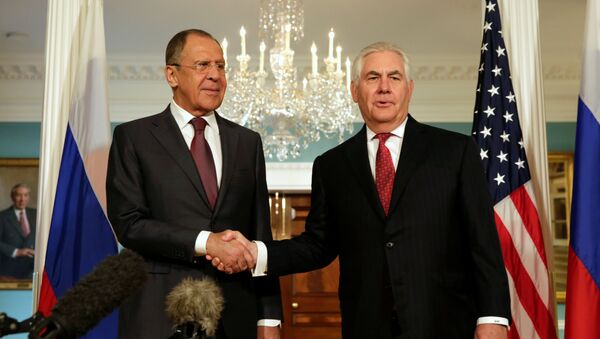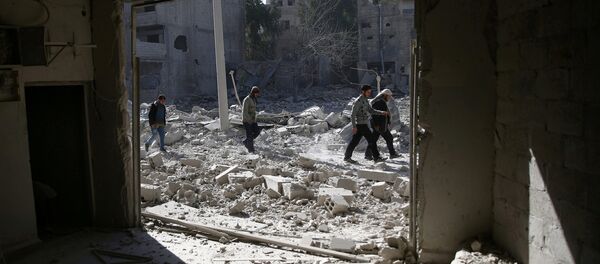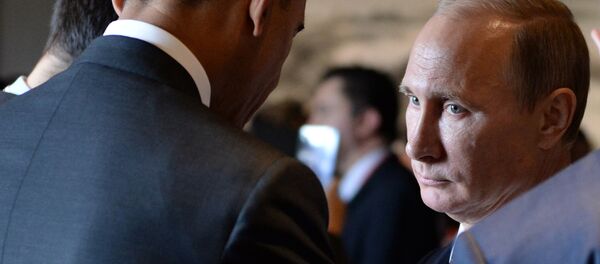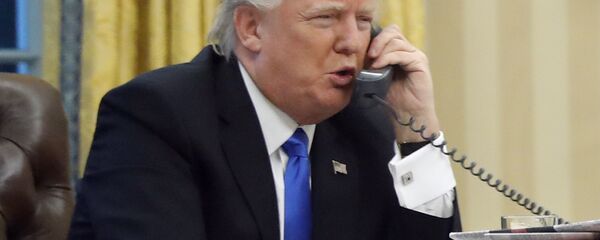What Was Discussed
Sergei Lavrov started the presser off by saying that he had discussed bilateral cooperation between the US and Russia with US President Trump and State Secretary Tillerson. He said that Syria, Ukraine, Afghanistan and the Israeli-Palestinian conflict have also been discussed.
Trump and Russian President Vladimir Putin are looking for tangible results of Wednesday's talks.
"There is a desire to move into the direction of settlement of all these problems… Both President Trump and President Putin are willing to attain concrete results that would help removing problems from the international agenda."
"In the recent telephone conversation the presidents confirmed that they’re going to meet on the sidelines of the G20 summit in Hamburg at the beginning of July," Lavrov stated. "They are going to see each other in July."
Syria Safe Zones
Russia and the US reached a conceptual agreement on geographical aspects of the de-escalations zones in Syria, Lavrov said.
"Today we have discussed the specific ways to jointly implement these agreements," Lavrov stated, referring to the safe zones in Syria. "We hope that the frameworks within which this process is evolving will be acceptable to all parties."
Lavrov added, "We certainly welcome US cooperation on the matter and hope that it will help move forward political settlement in Syria."
"We agree with Trump that the most important thing to do in Syria is to defeat terrorism," he said.
"We do not have such a notion as exit strategy, all of us should deliver on what we agreed upon," Lavrov stated. "We need to implement the UN Security Council resolutions, we need to suppress all terrorism modification in Syria."
Representatives of the countries-guarantors of the truce in Syria (Russia, Iran, Turkey) signed on May 4 a memorandum on the creation of four zones of de-escalation in Syria, which include the province of Idlib and seven other regions. According to the memorandum, any clashes between the government forces and opposition armed groups must stop within the zones.
The memorandum on these de-escalation zones took effect on May 6.
Bilateral Ties, Sanctions
Lavrov said that both Moscow and Washington want to remove all barriers for effective cooperation.
When asked if US sanctions against Russia were discussed, Lavrov said that Russia doesn't discuss such issues with foreign partners.
"We don't discuss sanctions. It is not our problem. It is one-sided actions taken against us."
Lavrov noted that the question of seized Russian property has been discussed in meetings with US officials.
"Everyone, including the Trump administration, understands that these were illegitimate actions," Lavrov stated. "We have a right to respond, but we have decided not to do it yet."
Late December, 2016, Barack Obama imposed sanctions on Russia over alleged interference in the November election. The Obama administration ordered the expulsion of 35 Russian diplomats, the closure of two Russian diplomatic compounds and new sanctions against six Russian individuals and five entities, including the Main Intelligence Directorate (GRU) and the Federal Security Service (FSB).
The Kremlin responded to US sanctions imposed on Thursday by declaring that they “will not resort to irresponsible ‘kitchen diplomacy,’” and reiterated their hopes to work toward a better relationship with the US when President-elect Trump takes office.
Dialogue With Trump vs Dialogue With Obama
He said that the Russia-US dialogue stopped being "ideologized" after this approach had been chosed by the Barack Obama administration. He said that the Trump administration is set to make deals with its partners.
He said that Trump's administration is business-like and willing to negotiate certain issues.
"Our dialogue as of now is free from ideology that was very typical for Obama’s administration," Lavrov stated. "Both Trump and Secretary of State and his administration as I realized today once again are business-like people and they want to reach agreements not for the sake of demonstrating their achievements to anyone in terms of their ideological preferences."
Alleged Russian Role in US Election
"It's humiliating for American people to believe that the Russian Federation is controlling the domestic situation in the United States. How can it be possible for such a great power?" Lavrov stated during a press conference following his meetings with Trump and Secretary of State Rex Tillerson.
When asked if Trump discussed the issue of alleged Russian interference in the November 2016 election, Lavrov said that such a "mayhem" has not been part of the discussion as the sides focused on "concrete" issues.
"There's no single fact proving the claims," he said. "We know Trump's position and the positions of those who claim the opposite," Lavrov said commenting on claims of alleged Russian influence on the US election process.
Russian officials have repeatedly denied allegations of interfering in the US election, and have characterized the charges as an absurd attempt to distract the US public from domestic concerns.





